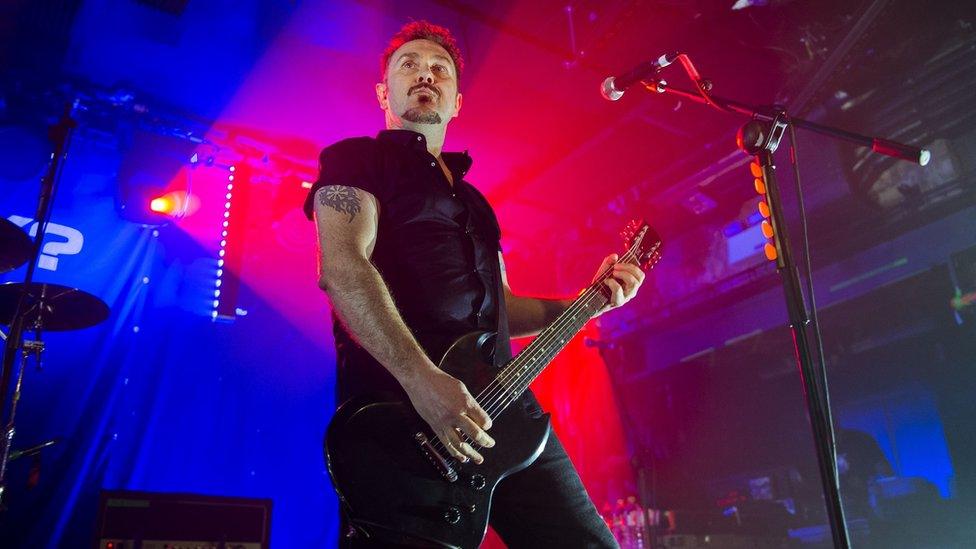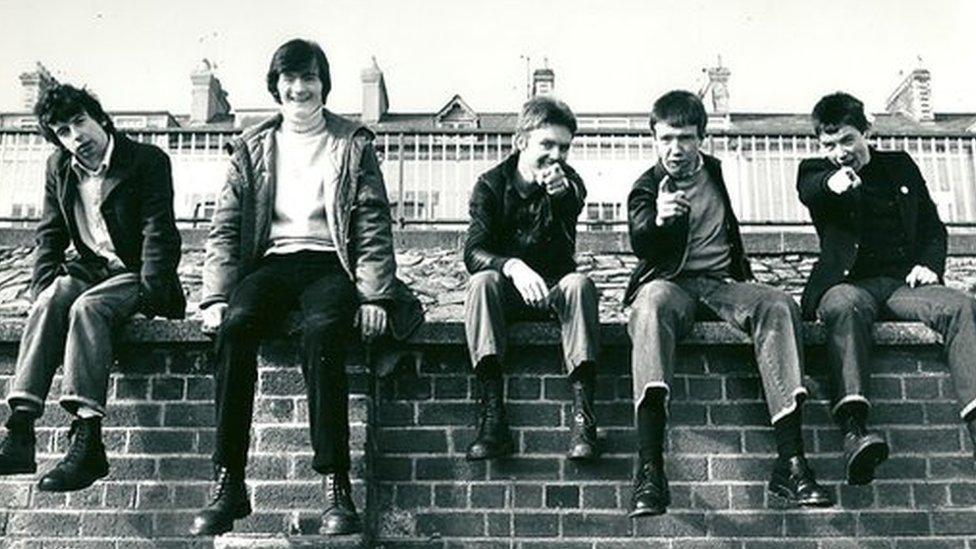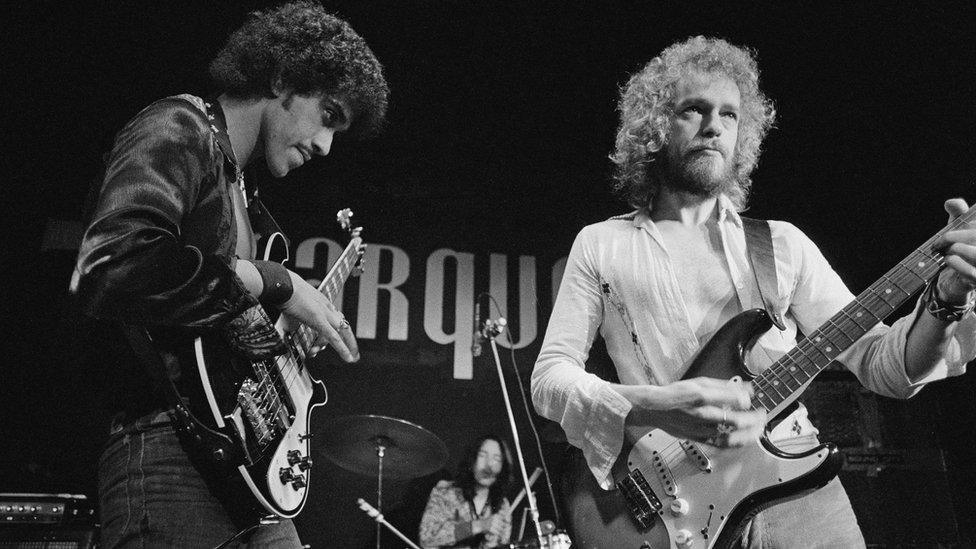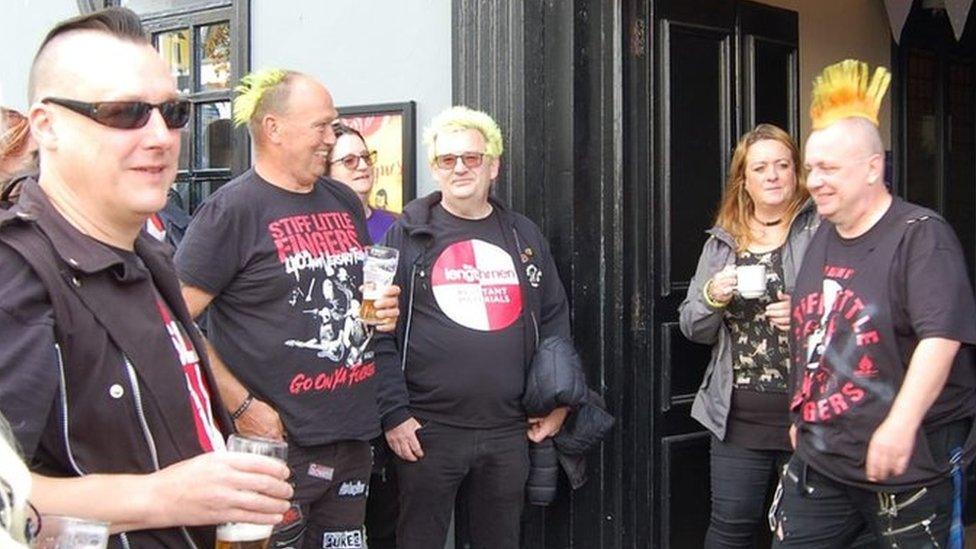Therapy?: Andy Cairns part of NI Guitar Heroes events
- Published

Andy Cairns, seen here playing with Therapy? at Belfast's Limelight in 2015, has been playing guitar since he was 13
"I can't book you, your hair's too short."
Therapy? guitarist Andy Cairns has come a long way since being turned down for gigs in Belfast for lacking long heavy-metal hair.
Now he is sharing that journey, along with some of Northern Ireland's other great guitarists, in Guitar Heroes, a series of events run by the Linen Hall Library and the Making the Future programme.
Stiff Little Fingers' Jake Burns, Eric Bell of Thin Lizzy and Ricky Warwick of the Black Star Riders are among those taking part throughout May.
All have decades in rock music and stories to tell.
Second-hand guitar
Andy Cairns' begins when he was a schoolboy aged 13 in Ballyclare, with punk, a neighbour's old guitar and the Boys' Brigade.
"I liked Stiff Little Fingers, the Undertones, I'd seen Rudi on TV and I knew about the Outcasts," he remembers.
"I started playing bass, because I really liked bass players, especially Jean Jacques Burnell from the Stranglers.
"A next door neighbour had an old guitar which belonged to her brother, who used to be in a showband but who didn't play anymore, so she actually came round one day and dropped it in to the house.
"I didn't really know how to play it but somebody at the Boys' Brigade down the road was a guitar tutor and he showed me bar chords because he found out that I liked the Undertones and Buzzcocks and punk.
"He basically said if you want to play punk learn a few bar chords and it started from there."

Cairns was inspired to pick up a guitar by bands like the Undertones
Cairns began playing for at least an hour a day every day, something he still does.
"I always had a guitar in the room so I didn't have to plug it in or lift it out of the case, there was always one tuned up sitting in the room," he told BBC News NI.
"I was gloriously untutored growing up - I never went for any guitar lessons apart from that one guy who taught me bar chords.
"I just picked up things myself and from people that I knew."
Early struggles
Therapy? were formed at the end of the 1980s with Andy, bassist Michael McKeegan and drummer Fyfe Ewing - but getting local gigs was not easy.
Venues were limited and getting on stage meant persuading bar managers to listen to your demo tape.
Therapy? played Belfast venues like Giro's, the Rosetta Bar and the Limelight but sometimes they faced unexpected obstacles - especially at the Rosetta, a hardcore heavy metal bar.
"You had to go and see a man who knew somebody else who knew somebody else to try to get on the bill," Cairns recalls.
"We had a demo tape out and I drove up to the Rosetta Bar with Michael in the car, and we had phoned the guy and said: 'Can we send you a demo tape?'
"We got there and he actually said: 'I can't book you, your hair's too short!'
"He said: 'You'd get killed, it's a rock bar!'"
That aside he remembers the music scene - especially the punk scene - in Northern Ireland as something that brought people from different backgrounds together despite the Troubles.
"When I was a kid and I started going to gigs at 14 or 15 and would go with friends or whatever, some of the areas my mum or dad would say, 'where are you going tonight?'
"I'd tell them and they'd say 'you need to be careful going round there', but I'd say 'it's alright dad, everyone's listening to the same music'."

Eric Bell, seen here on the right with Thin Lizzy bandmates Phil Lynott and Brian Downey, will also be taking part in a talk
Andy Cairns now lives in England, but returns to Northern Ireland frequently and for years has noticed a positive change.
"I just love the vibrancy of the place," he said.
"I began to notice it years ago, after the Good Friday Agreement.
"Alternative Ulster magazine started up and there were loads more gigs - whether it was Skibunny or other places like Voodoo, there were just lots more venues."
He is still passionate about Northern Ireland music - raving about songs by local bands like Enola Gay, Wood Burning Savages, New Pagans and others.
But given the halt to live music caused by the coronavirus pandemic, when will Therapy? be on stage again?
They had planned a 30th anniversary tour in 2020, which had to be postponed, but there is at least some good news for fans in a difficult time for everyone in music.
"We've been in rehearsals and got some recording done - that was two weeks ago," Cairns said.
"It had been 14 months since we'd actually seen each other.
"Everyone's got computers and MP3 recording, so we've been writing and sending each other things and the new album is nearly finished, but it's no consolation for being in a room.
"The last 14 or 15 months is the longest we've gone without a gig."
"Everything dried up."
Cairns said some of their crew had been forced to get other jobs because music-based work simply was not available for them.
"Music has a way of surviving, but people that are making the shows happen will find it tougher and I think this might wake up a few people as to how indispensable these people are," he said.
"I do think people might be a bit more grateful for those people, especially whenever things get back to some kind of normal."
The Guitar Heroes series of talks from Making the Future takes place online on Mondays and Thursdays from 10 to 27 May.
All talks are free and places can be booked via the Making the Future website, external.
- Published10 September 2018
